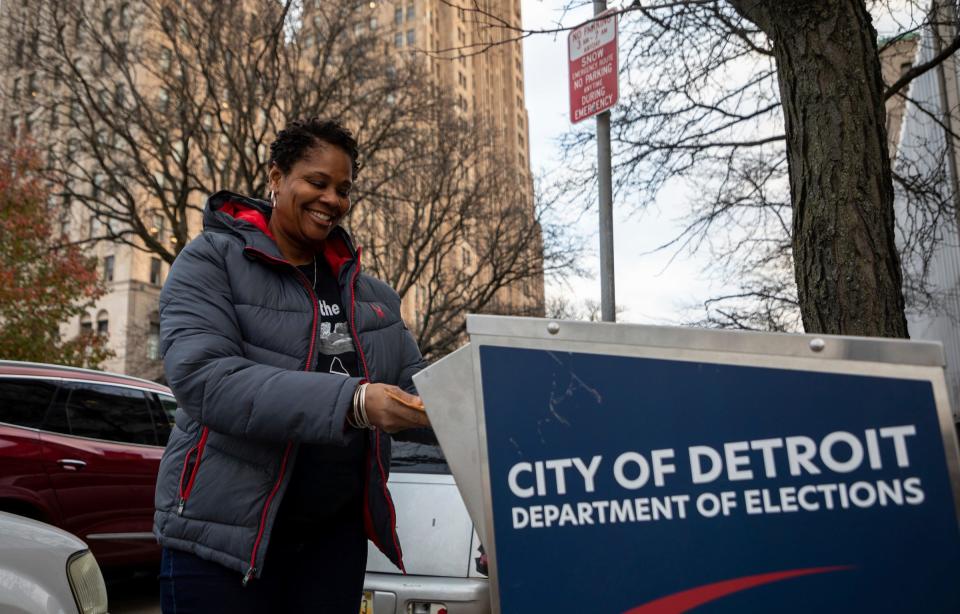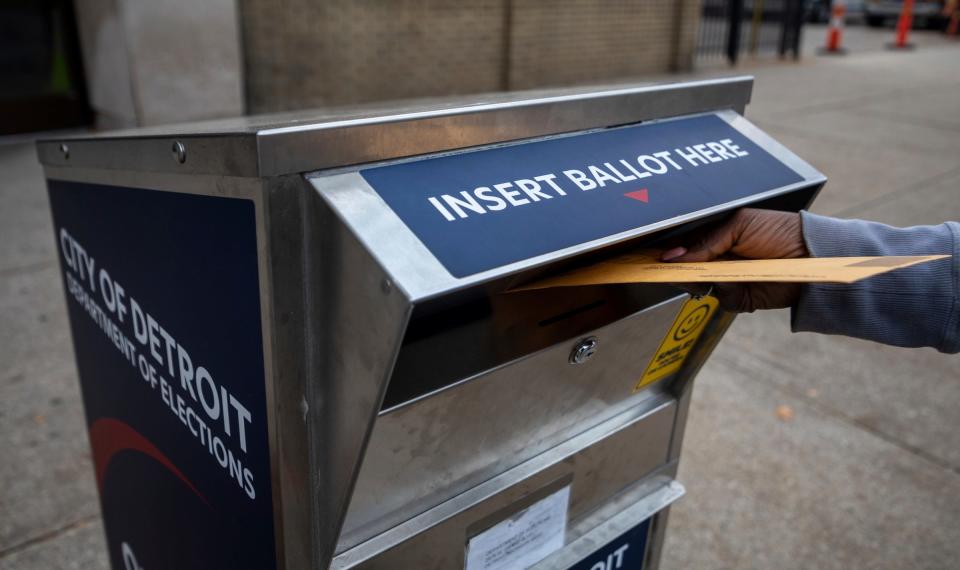Proposal 2: Voting rights proposal approved in Michigan
Michigan voters adopted Proposal 2, a wide-ranging constitutional amendment to establish early voting, preempt Republican efforts to enact more stringent voter ID rules and expand access to absentee voting.
With political battles over election administration front in center in American politics, the constitutional amendment in Michigan gave voters in the state an opportunity to weigh in directly on future election rules.
As of 2:30 p.m. Wednesday, with an estimated 89% of the votes counted, 60% of Michigan voters in the Nov. 8 election approved Proposal 2, while 40% voted against it, according to unofficial results compiled by the Associated Press. Voters on Tuesday approved all three constitutional amendments on the ballot, adding reproductive rights and modifying legislative term limits and adding required financial disclosures for some elected officials to the state constitution.
The measure establishes an entirely new voting option in Michigan; one currently available to many voters in other states across the U.S.
Currently, Michigan voters cannot vote early. They can fill out and return an absentee ballot in person at their local clerk's office. But Proposal 2 requires at least nine days of early voting ahead of statewide and federal elections. At early voting centers, voters could complete their ballot and insert it into a tabulator just as they would at their Election Day polling site.

"If some people need to vote a little bit earlier, let them vote a little bit earlier," said Christian Carter, 36 of Detroit, who supported the proposal which he saw as a way to protect voting rights in Michigan against efforts to erect barriers to the ballot box.
Since Michigan voters adopted a constitutional amendment in 2018 giving every voter in the state the right to cast an absentee ballot, many municipalities have set up drop boxes to receive those ballots and provided prepaid postage for return envelopes. But Proposal 2 requires at least one state-funded drop box in every municipality, with additional boxes for every 15,000 voters. Detroit, for instance, is home to more than 500,000 voters, meaning the city would have more than 30 drop boxes under the proposal. It also requires state funding for prepaid postage for applications to request an absentee ballot and envelopes to return ballots.

It makes one major change to the absentee voting process in the state — it would allow registered voters to fill out a single application to request an absentee ballot for all future elections.
"Michigan voters clearly support ensuring every voice is heard and every vote is counted in every election, no matter what political party or candidate we support, where we live or what we look like," said Micheal Davis, executive director for Promote the Vote, the group behind the amendment.
"We've shown, time and again, that voters, no matter who we support, share a belief that every eligible voter should have convenient access to the ballot and have their vote counted," said Nancy Wang, executive director of Voters Not Politicians, whose volunteers helped collect signatures to put Proposal 2 on the ballot.
In other ways, Proposal 2 preserves current election procedures by placing them in the Michigan Constitution, increasing the barriers to future efforts to change them. Proposal 2 enshrines current voter photo ID rules for those voting in person and the signature verification process for those casting an absentee ballot. Republicans have passed legislation proposing stricter voter ID rules vetoed by Democratic Gov. Gretchen Whitmer.
Whitmer also vetoed GOP legislation to bar donations to election offices which Proposal 2 protects by allowing counties, cities or townships to accept publicly-disclosed charitable donations and in-kind contributions to conduct elections.
Proposal 2 would also clarify procedures for certifying elections in the state after the 2020 presidential election saw a dramatic canvassing process. That year, the Republican members of the Wayne County Board of Canvassers initially refused to certify the results and one GOP member of the State Board of Canvassers abstained from the certification vote.
The aftermath of the 2020 election also ushered in calls for a so-called forensic audit after election officials had already carried out hundreds of post-election reviews. Proposal 2 spells out that only election officials can conduct election audits and they must do so in public with publicly disclosed funds.
Finally, Proposal 2 would require clerks to accept absentee ballots cast by military and overseas voters that have a postmark on or before Election Day if election officials receive those ballots within six days of an election.
County canvassing boards must review and sign off on the election results by Nov. 22. The Board of State Canvassers is scheduled to meet Nov. 28 to certify the election.
Clara Hendrickson fact-checks Michigan issues and politics as a corps member with Report for America, an initiative of The GroundTruth Project. Make a tax-deductible contribution to support her work at bit.ly/freepRFA. Contact her at [email protected] or 313-296-5743. Follow her on Twitter @clarajanehen.
This article originally appeared on Detroit Free Press: Proposal 2: Michigan voters approve early voting measure